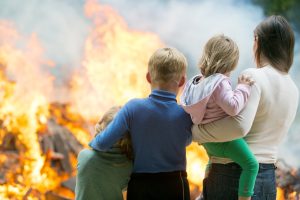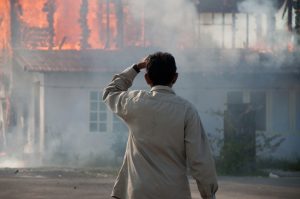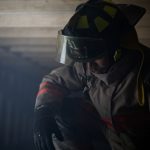Rebuilding and Rising: What To Do After a House Fire
A house fire can be one of the most catastrophic experiences that a person can experience causing serious damage not only to the home but mentally and physically to the victims as well. These fires can happen for a variety of reasons including:
- Appliance failures
- Defective wiring
- Arson
- Lit Candles
- Children playing with fire
- Christmas trees and decorations
- Smoking
- Cooking equipment and accidents
- Barbecues
- Defective wiring
- Flammable liquids
- Gas leaks
- Lighting or lamps
- Lightening
Sadly, when it comes to house fire, fire is not the only thing to worry about. With fires comes smoke damage that can ruin the structure of your home and everything in it. Personal items may be soaked with the water that was used to put the fire out. Furthermore, the high heat can also melt plastic and cause appliances, equipment, and other personal items to be ruined beyond repair.
It is also common that firefighters may have broken windows or cut holes in the roof or walls to slow a fire’s growth and get rid of the dark smoke. All of these factors cause further damage. Even post-fire, there is a risk of illness due to mold, soot, dirty water, and the bacteria that could potentially be in it.
Sombering House Fire Statistics
Let’s put how damaging, costly, and fatal house fires can truly be in perspective with these statistics gathered by the Federal Emergency Management Agency (FEMA).
- On average, a house fire happens every 87 seconds
- $11.1 billion is lost to property damage caused by home fires annually
- The top three causes of home fires are cooking, heating equipment, and electrical malfunction
- It can take just 30 seconds for a small flame to turn into a major blaze
- An average of 358,500 homes experience a structural fire each year
- 3,000+ Americans die in fires each year
- One civilian fire-related death occurs every 144 minutes
- The majority of home fire deaths are caused by smoke inhalation
- Christmas tree fires cause approximately $17.5 million in damages every year
- In less than five minutes, the heat from a house fire can reach 1100+ degrees Fahrenheit
Best Fire Safety Practices
While fires might not always be preventable some best fire safety practices can help save lives. It is essential to prioritize fire safety and to practice fire safety measures regularly. Some best practices to protect you and your loved ones include:
- Make and practice a home fire escape plan: Ensure there are two ways to escape from every room, Have a common meeting spot outside the home, Establish emergency communication plans, Practice at least every 6 months, Make sure all members of the family can dial 911
- Smoke Alarms and Detectors: Install them in strategic locations including the kitchen, bedrooms, and near fireplaces or stoves, Have ONE smoke detector on every floor, Replace batteries once a year, test twice a year, If anyone is hearing impaired, install special smoke detectors that have strobe or vibration options, Replace entirely every 10 years or when damaged
- Install a carbon monoxide alarm in a central location
- Have a fire extinguisher in an accessible, central location
- Have your house number visible and readable from the street so emergency services can easily find your home
- Make sure home heating sources are clean and properly working: This includes furnaces, stoves, furnaces and chimneys
- Check electrical wiring: Fix and replace frayed cords, exposed wires, and loose plugs, Make sure electrical outlets have cover plates and no exposed wiring, Avoid overloading outlets and extension cords
Steps To Take After A House Fire
After an event as traumatic as a house fire, most individuals will understandably be overwhelmed with emotions of stress and uncertainty. Remember these feelings are normal. While some fires can cause an absolute loss, it is still possible to recover and move forward.
After an event as traumatic as a house fire, most individuals will understandably be overwhelmed with emotions of stress and uncertainty. Remember these feelings are normal. While some fires can cause an absolute loss, it is still possible to recover and move forward.
 Call 911
Call 911
After an event as traumatic as a house fire, most individuals will understandably be overwhelmed with emotions of stress and uncertainty. Remember these feelings are normal. While some fires can cause an absolute loss, it is still possible to recover and move forward.
Personal Contacts
Contact any family or friends who need to be made aware of the fire. This can also give time to help plan what’s next like where you will be staying. If you rent and do not own your home, this would be the time to contact the property owner to let them know about the fire and other related information.
Contact Your Insurance
One of your next contacts should be your insurance company. They will give you the next steps and can give you recommendations for companies who specialize in cleaning, fire damage restoration, and smoke damage repair, in some policies the insurance will pay for the cleaning.
Once contacted, this will start the process of documentation and begin the claim process. Your agent should be able to guide you through the process of emergency lodging and pay for living expenses such as food and clothing. Be sure to have and supply copies of fire reports, any medical documentation or expenses related to the fire, and a personal inventory of your items to your insurance to help ensure proper compensation.
 If you do not have insurance, there are organizations that can help you get back on your feet. These organizations include:
If you do not have insurance, there are organizations that can help you get back on your feet. These organizations include:
- American Red Cross
- Salivation Army
- Religious Organizations
- Public Agencies such as the Public Health Department
- Community Groups
- State or county emergency service offices
- Nonprofit crisis counseling centers
Assess The Damage
Do not enter the home until the fire is out and the fire department has deemed it safe to enter Fires can appear out of nowhere, roofs and floors may be unsafe or there could be health risks due to smoke, soot, or still water. When you have clearance to enter the home focus on retrieving valuables and important paperwork including birth certificates, medical records, deeds or leases, social security cards, marriage or divorce papers, or adoption records. This is also a time to grab sentimental items such as family photographs or irreplaceable heirlooms.
Whether it is you or a restoration company sorting your belongings, your possessions need to be sorted between damaged and undamaged. The main reason for this is that it will make it easier for you to create a list of the items that were damaged for the insurance company. This also provides you with another opportunity to ensure you have all your valuable items accounted for.
Know When To Get Help
Fires can be traumatic enough and dealing with insurance companies over compensation can be a heavy burden, especially after dealing with a trauma and if you’re in a situation where your valid claim gets denied, that burden can feel crushing. There are a few reasons why claims can be denied but you do have a right to appeal the decision.
If you find yourself in this position, consider hiring a lawyer who is experienced in property damage and can assist you with evidence, explaining legal rights, arriving at an accurate estimated value for loss, handling negotiations with insurers, and fighting for the compensation you deserve.
Focus on You and Your Family
Fires, insurance claims, and moving forward can all be incredibly overwhelming for anybody. Once you have done what is necessary to begin to restore your home and life, take the time to focus on the mental and physical health of those involved. Pay closer attention to how loved ones are handling the stress and promote mental and emotional recovery in whatever way works for your family.




